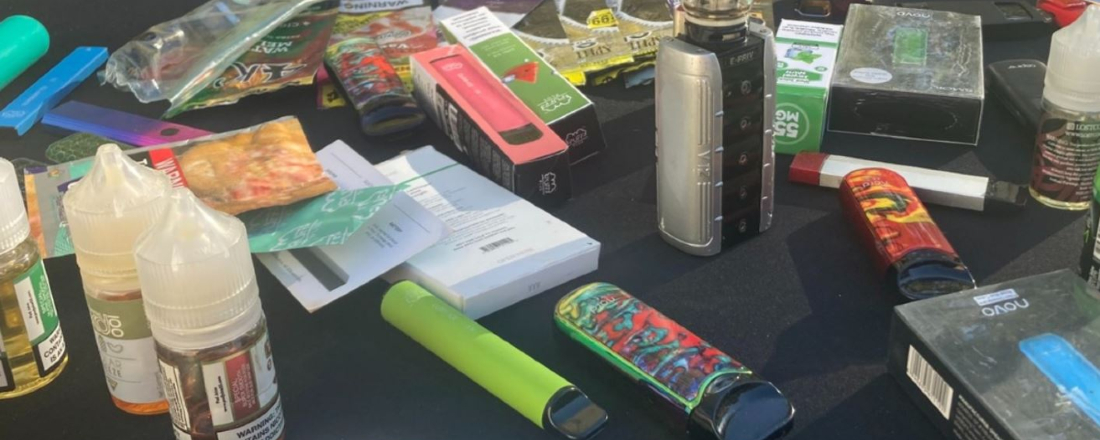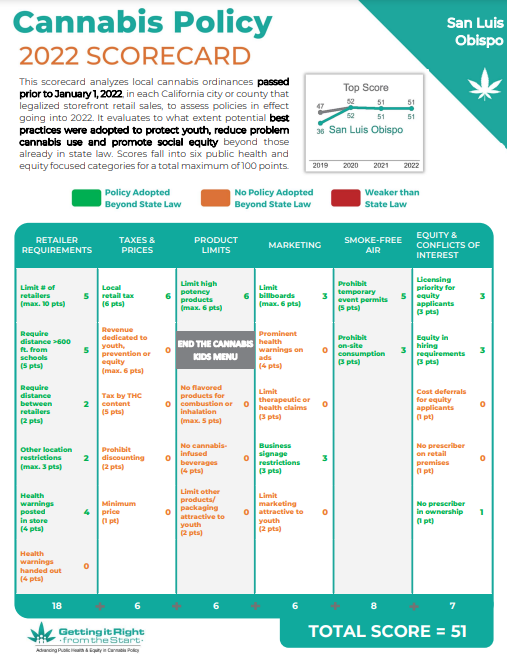
Press Release
Are Local Cannabis Policies Protecting Us? Scorecards Reveal Pathway Forward for California Cities and Counties to Better Protect Youth & Public Health

(Oakland, CA) Today, Getting it Right from the Start, a project of the Public Health Institute (PHI), released its 4th annual Local Cannabis Policy Scorecards, which track and evaluate policies passed by cities and counties that allow legal cannabis retail sales. The scorecards offer practical information for communities on how to provide safer legal access without driving up harmful consumption.
The findings also highlight local innovation and the underutilized potential of localities to better safeguard youth and support social equity. The statewide average score was 21 of 100 possible points (the same as last year) across all jurisdictions allowing storefront retailers, and only 11 for those allowing sale only by delivery, illustrating the enormous space for local action.
“The legal market in California has grown enormously and is now stabilizing,” noted pediatrician Lynn Silver, MD, MPH, who heads PHI’s Getting it Right from the Start program. “Yet, the state and many local jurisdictions still failed to put in place the guardrails necessary to protect youth and public health. These scorecards provide a clear roadmap for cities and counties to meet this moment.”
With notable exceptions, the findings serve as a stark reminder of California’s failure to take seriously the public health threat posed by expanding cannabis usage. Unchecked increases in highly potent products, sophisticated and effective marketing tactics, and growing political influence, demand a more proactive response. Instead, California has witnessed a tripling of daily or near daily use by California adults, a near doubling of cannabis use during pregnancy over the past decade, and a 53% increase in cannabis-related emergency department visits in just three years, among other preventable harms.
The city of San Luis Obispo (SLO) was once again the top scorer among localities allowing storefront sales, with 51 points, thanks to several early and bold actions such as limiting the number of retailers and distancing them from places that serve youth. South Lake Tahoe was the most improved jurisdiction that allows storefronts, rising 12 points after enacting a local tax with revenue dedicated to youth programs.
The top scorer among delivery-only jurisdictions, San Benito County, with 35 points, restricted delivery locations, passed a local tax, and prohibited billboards and temporary cannabis events such as sales at concerts or fairs. Burlingame was the most improved delivery-only jurisdiction, rising from 3 to 21 points by adopting limits on signage and prohibitions on delivery to youth-sensitive areas.
“The practical information PHI offers to cities and counties is informative and valuable. We used it to help design our local cannabis policy that prohibited flavored inhalable cannabis products that hook kids,” says Dr. Ori Tzvieli, Contra Costa County’s Public Health Director. “Local governments’ decisions over the next few years will be critical in protecting youth from becoming dual substance users and being lured to flavored cannabis vaping. Without swift action, we could expose younger generations to harm for decades to come.”
While the state remains dangerously remiss on increasing product potency levels and refuses to require effective health warnings, a handful of innovative pioneers took on potency. SLO prioritizes retail applicants that offer low-THC products and Grass Valley and Cathedral City tax high potency products more heavily. Contra Costa County and Pomona prohibit sale of vaping devices.
Recognizing the role of flavors in initiating youth use, Contra Costa County, Watsonville, and Chico prohibit non-cannabis flavored inhaled products and Mammoth Lakes prohibits labeling non-edible products as flavored. Twenty nine localities, including San Francisco, saw the necessity of requiring health risks information be distributed to consumers in ways beyond the ineffective and hard-to-read state-required package warning.

2022 Scorecard Highlights Include:
• 76% of jurisdictions limit the number of allowed storefront retailers—one of the most important and widely adopted policies.
• 58% have stronger buffers than the state minimum to distance stores from youth serving institutions or other sensitive use sites.
• Backsliding on allowing on-site consumption in 44 jurisdictions—bringing back smoke-filled rooms
• Only 22 jurisdictions have ordinances that prioritize equity in hiring or licensing despite economic equity being a key rationale for legalization.
• 165 jurisdictions have enacted local cannabis taxes. Yet only 17 of those dedicate cannabis tax revenue to substance abuse prevention, youth education, or mitigating harms caused by the criminalization of cannabis.
Despite industry claims to the contrary, the scorecard data indicates legalization continued to spread across the state: By January of 2022, 61% of Californians lived where they could legally buy cannabis (up from 56% in 2019), and many more were within an easy trip to retailers in neighboring jurisdictions. Only 4 of 58 counties had no location allowing legal sale, one third of jurisdictions allowed storefronts, and an additional 20% allowed sales only by delivery, including 85 which don’t issue local licenses but permit delivery from outside their jurisdiction.
The scorecards, the research methodology and many other resources are available at www.gettingitrightfromthestart.org.
Important Note: These scorecards reflect how local laws protect youth, public health and equity. They do not capture how local governments are implementing their laws, inspecting cannabis businesses, or funding prevention and implementation, which we recognize many local governments staff work hard to do—and do well.
Getting it Right from the Start, a project of the Public Health Institute, works with states, cities, counties and community partners to develop evidence-based model policies and provide guidance on cannabis policies that can help reduce harms, protect against youth and problem cannabis use, and advance social equity.
More Updates
Work With Us
You change the world. We do the rest. Explore fiscal sponsorship at PHI.
Support Us
Together, we can accelerate our response to public health’s most critical issues.
Find Employment
Begin your career at the Public Health Institute.



